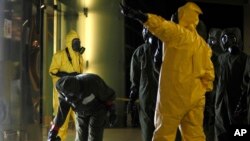Malaysia has charged two women with the killing of the half-brother of North Korea’s leader at the Kuala Lumpur airport last month.
Siti Aisyah, a 25-year-old Indonesian, and Doan Thi Huong, a 28-year-old woman from Vietnam, appeared at a court in Kuala Lumpur under heavy security.
Court officials did not ask them to officially declare their innocence or guilt. Reuters news service reported that the court in which the women appeared would likely not be the one to try the murder case.
However, the women have said they did not knowingly attack the person identified as North Korean Kim Jong Nam. They said they believed they were taking part in a joke for a television program.
When the charges were read, Doan Thi Huong told the court, “I understand, but I am not guilty,” in English.
The two face the death sentence if found guilty.
Malaysian officials say the women attacked Kim Jong Nam using a powerful poison at the Kuala Lumpur Airport. He died 20 minutes later.
The officials say the poison was the deadly nerve agent VX.
Kim is the half-brother of North Korean leader Kim Jong Un.
Malaysia has blamed North Korea for organizing the killing and is seeking additional suspects in the case.
On Tuesday, a North Korean delegation arrived in Kuala Lumpur seeking the body of the man.
North Korea’s official news agency has denounced the findings as the “height of absurdity.” It said the women could not have used such a poison without harming themselves and others.
Malaysia continues to hold the body of the man, who North Korea identifies only as Kim Chol, the name of his passport.
Incident has brought intense criticism of North Korea
The killing in Malaysia has caused some lawmakers in the United States to consider further punishments for North Korea.
Ted Yoho, a Republican representative from the state of Florida, says there is support for returning North Korea to the list of countries that support terrorism. Congress placed North Korea on the list after the bombing of a South Korean airplane in 1987 which killed 115 people.
North Korea was removed from the list in 2008 as part of a deal to reduce its nuclear program.
The State Department says the U.S. secretary of state must find that the North has “repeatedly provided support for acts of international terrorism” to return it to the list. Currently, three nations -- Iran, Sudan and Syria -- are on the list.
Experts disagree on whether the attack in Kuala Lumpur can be defined as an act of terrorism.
Joshua Stanton is a lawyer who specializes in sanctions. He says the killing along with North Korea’s many other acts means that North Korea should be returned to the list.
However, Daniel Benjamin, a former U.S. State Department counterterrorism official, says the case is very unusual and lies in a “gray zone.”
A State Department spokesperson told VOA that the department uses “all available information and intelligence, from a variety of sources” on North Korea.
The spokesperson added that, “even without being designated as a State Sponsor of Terrorism, North Korea remains among the most heavily sanctioned countries in the world.”
I’m Ashley Thompson.
Chris Hannas, Jenny Lee, Cho Eunjung and Baik Sungwon reported this story for VOA News. Mario Ritter adapted it for VOA Learning English. Caty Weaver was the editor.
We want to hear from you. Write to us in the Comments Section and share your views on our Facebook Page.
Editors Note: An earlier version of this story incorrectly gave Kim Il Sung as the father of Kim Jong Un. Former North Korean leader Kim Jong Il was the father of North Korea's current leader.
_____________________________________________________________
Words in This Story
plea –n. an official statement of guilt or innocence given in a court of law
absurdity –n. extremely foolish, making no sense
designate –v. to officially chose as, to identify something or someone as
sanctioned –adj. to be the subject of sanctions







